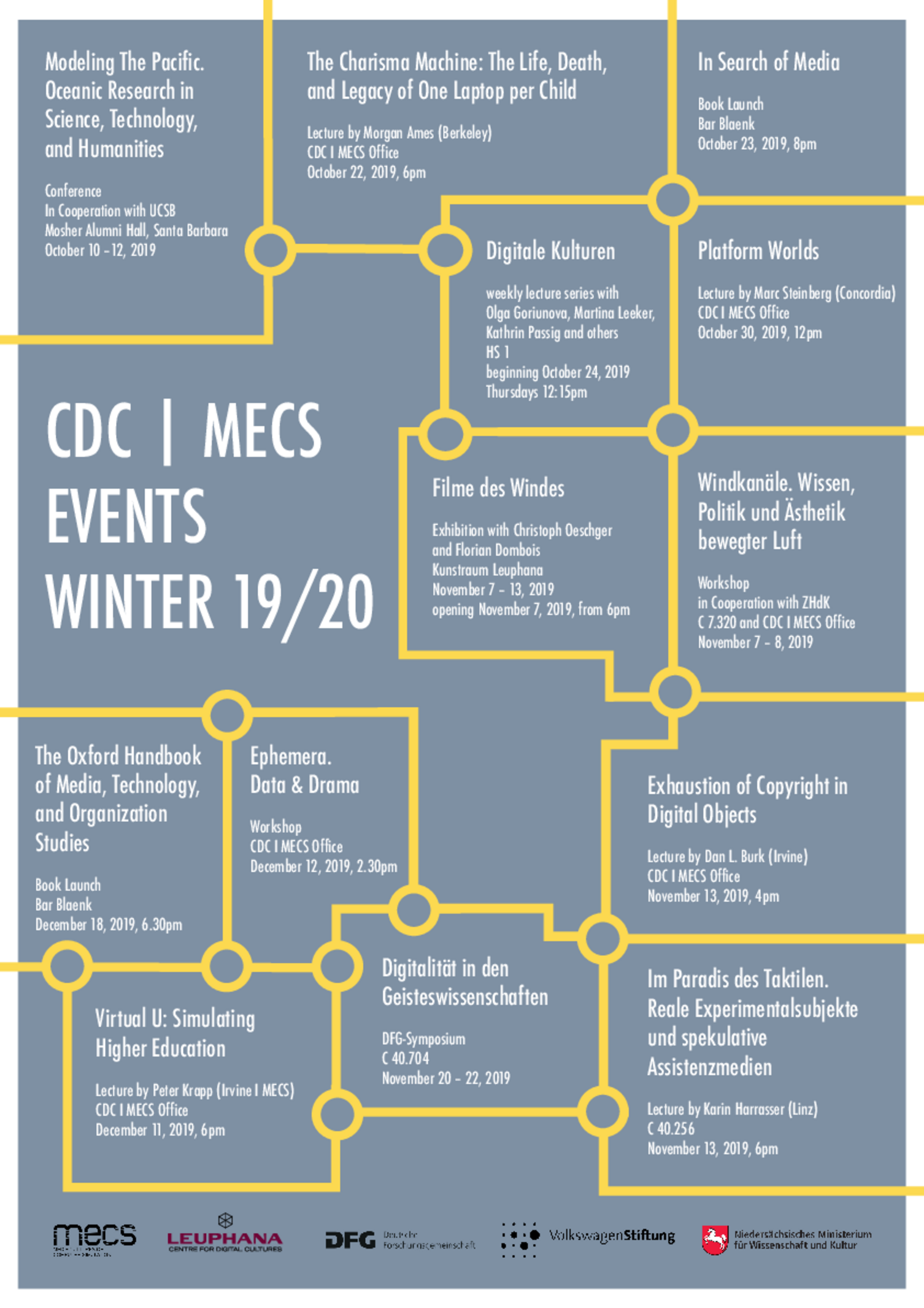| October 10–12, 2019 | ||
Modeling The Pacific. Oceanic Research in Science, Technology, and Humanities Mosher Alumni Hall, Santa Barbara | ||
| October 22, 2019 | ||
6pm | The Charisma Machine: The Life, Death, and Legacy of One Laptop per Child | |
| October 23, 2019 | ||
8pm
| In Search of Media | |
| October 24, 2019 | ||
12:15pm | Digitale Kulturen | |
| October 30, 2019 | ||
12pm | Platform Worlds CDC | MECS Office, Lüneburg | |
| November 7–13, 2019 | ||
| Filme des Windes | |
| November 7–8, 2019 | ||
Windkanäle. Wissen, Politik und Ästhetik bewegter Luft C 7.320 and CDC | MECS Office | ||
| November 13, 2019 | ||
4pm | Exhaustion of Copyright in Digital Objects CDC | MECS Office, Lüneburg | |
| November 13, 2019 | ||
6pm
| Im Paradies des Taktilen. Reale Experimentalsubjekte und spekulative Assistenzmedien C 40.256 | |
November 20–22, 2019 | ||
| Digitalität in den Geisteswissenschaften | |
| December 11, 2019 | ||
6pm | Virtual U: Simulating Higher Education CDC | MECS Office, Lüneburg | |
| December 12, 2019 | ||
2:30pm
| Ephemera. Data & Drama | |
| December 18, 2019 | ||
6:30pm | The Oxford Handbook of Media, Technology, and Organization Studies Book Launch Bar Blaenk, Lüneburg | |
| Janaury 15, 2020 | ||
| 6pm | DRM und andere Verschlüsselungen CDC | MECS Office | |
| January 22, 2020 | ||
| 2:30pm | Datenfilme. Zur digitalen Reanalyse eines analogen Strömungsfilms CDC | MECS Office | |
| January 29, 2020 | ||
| 6pm | Dying experiments. A case study Lecture by Lukas Mairhofer CDC | MECS Office | |
Dan Burk
Exhaustion of Copyright in Digital Objects
Intellectual property systems create the possibility of conflicting overlapping ownership in books, DVDs, or other media objects: an owner of the intellectual property itself and a different owner of the physical object in which the intellectual property is embodied. This problem is generally solved by the legal doctrine of exhaustion, or termination of the intellectual property owner’s rights at the time of an authorized sale of the associated physical object. However, the application of this solution has become unclear for digital property that has no physical embodiment. In this lecture, I discuss how this problem has been approached on each side of the Atlantic, using the differing approaches as a vehicle to understand resolution of disputes in the information age.
Dan L. Burk is Chancellor’s Professor of Law at the University of California, Irvine, where he was a founding member of the law faculty. An internationally prominent authority on issues related to high technology, he teaches and writes on patent law, copyright, and related topics. Professor Burk holds a B.S. in Microbiology (1985) from Brigham Young University, an M.S. in Molecular Biology and Biochemistry (1987) from Northwestern University, a J.D. (1990) from Arizona State University, and a J.S.M. (1994) from Stanford University. He is the author of numerous papers on the legal and societal impact of new technologies, drawing on interdisciplinary insights from social science, physical science, and the humanities. During the Fall of 2019, he will be a Senior Visiting Fellow at the Weizenbaum Institute for the Networked Society in Berlin.
Lukas Mairhofer
Dying experiments. A case study.
Working experiments are the exception rather than the rule. Experimental setups seem to be broken pretty much all the time, and building, aligning, maintaining and repairing the apparatus form a much larger part of laboratory work then actual measurements. Faults and failures of technical instruments increase over time, limiting the lifetime of experimental setups. The fragility of the apparatus exhibits the multitude of agencies contributing to an observation. These agencies act on cultural, social, material and political levels.
Here I will present the case of a dying quantum physics experiment, the Kapitza-Dirac-Talbot-Lau interferometer for molecules of the Vienna QuantumNanoPhyiscs group. This outstanding interferometer currently holds the world record for the largest particles exhibiting quantum delocalization and superposition, demonstrated by producing a nano-structured fringe pattern of these molecules.
I will discuss the lifecycle of the experiment and how it was shaped by funding, career interests and inherent limitations of the apparatus. Its performance decreased significantly after about ten years of successful operation, and the interference fringes began to fade. This becomes clearly visible when taking a look at the number of publications the experiment yielded. The failure of the apparatus triggered intense social conflicts within the group, driven by questions of power and differences in culture as well as experimental practice, but also influenced by external political pressure. Over a period of two years parts were exchanged and the interferometer realigned, giving insight into the interdependence of the material practices and the status of the interference-pattern as artifact. Finally it was declared dead and bid farewell with funeral rites.

